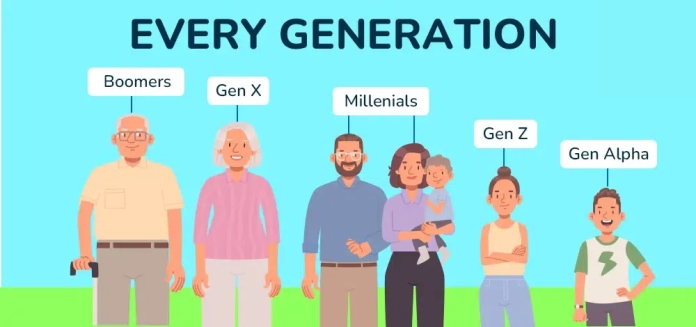As we approach the end of 2024, one of the topics that are currently the talk of the town is the beginning of a new generation from 2025. Generation Alpha is going to end in 2024 and the babies born in the upcoming year will be called the Generation Beta. While everyone is talking about different types of generations like Millennial, GenZ, and GenAlpha, some of us are still struggling to figure out how the generation system works. If you are also one of us, this article brings you a detailed guide on types of generations and years. It will also include the reason as to exactly why this system is important.
Types Of Generations And Years
How Can Generations Be Defined?
If we look at the ancient definitions of the term “Generation”, people used it to describe all the people alive. However, as time passed, the term got its biological meaning. It defined the term as the span of time from when an individual is born to when they have children. This definition of generation also proved ineffective since the median age of people having children started stretching to 30 years. The time span became too huge to define the term.
In today’s day and age, Generation is more a sociological term and spans up to 15 years. This offers a more accurate and organized way of defining the various types of generations. The new system defines exactly when the old generation ends and the new begins making generational analysis easier.
Also read : 50 Gen Z Slang Words That Instantly Make You Sound Cooler
What Is Generational Analysis And Why Is It Important?
Generational Analysis has gained significant popularity and importance. It is now accepted as a mainstream field in both sociology and the world of academics. Businesses also consider generational analysis important to behavior. Generational analysis simply means analyzing various generations and determining the differences that exist between them. It also includes determining the general personality traits of people belonging to a certain generation. It is important for people managing human resources to understand the types of generations they are dealing with. In today’s world, there are more than three generations mixing together in a family or a workplace. Hence, it is important to understand their differences and nuances to create communities that are cohesive.
How Many Types Of Generations We Have So Far?
According to the sociological method of dividing years into generations, we have six generations so far. The Builders are the first generation born before 1946. Baby Boomers are the second generation born between 1946 and 1964 is called the Baby Boomers. Generation X is the third generation born between 1965 and 1979. Gen Y is the fourth generation born between 1980 and 1994. Generation Z is the fifth generation born between 1995 and 2009. Generation Alpha is the sixth generation born between 2010 and 2024. The upcoming Generation Beta is the seventh generation born between 2025 and 2039. A detailed explanation of all the generations is given further in this article.
1. The Builders
The Builders, also known as “The Greatest Generation” or the “Silent Generation”, had people born in the years before 1946. The label of their generation aptly signifies their contribution to building up the society we now live in. This generation has seen some of the darkest times of humanity including both the World Wars and dictatorships. Generation of seniors is the title given to them today. Builders contributed to building the infrastructure, institutions, and suburbs. They are the ones who taught our society the values we still uphold. They are understanding as well as appreciative of the growth the younger generations have made.
2. The Baby Boomers
Baby Boomers, commonly known as Boomers, are the generation that was born between 1946 and 1964, preceding the builders. This generation was labeled after the boom in the population that took place in this generation. The fertility rate in this generation was as high as 3.5 babies per woman. The rise in the population also led to a boom in the economy. Construction of houses and infrastructure was also doubled to accommodate the growing population.
This generation was one of the most empowering generations in the societal context. They participated in protests against wrong political decisions, advocated feminism, and longed for equality. Social warriors was one of the apt titles given to the people of this generation. They brought massive cultural changes as well as economic revolutions. Their contributions are impactful even today. This generation had a high net worth. It was often called the “the bank of mum and dad”.
3. Generation X
Generation X consists of people born between 1965 and 1979. This generation preceded the Boomers. A famous author named Douglas Coupland’s novel inspired the name of their generation. The generation preceding boomers came up with the idea of anti-establishment. Many born in this generation were highly into property ownership which soon became a new trend. Until the pandemic, this generation enjoyed economic prosperity. Hence, they laid the foundation of small businesses and embraced many new entrepreneurial opportunities.
Generation X did exceptionally well in their time despite the chaos that took place in the beginning. They established themselves economically pretty well and their net worth rose significantly from the early nineties. This generation was one of the biggest contributors to the economic growth of the society.
4. Generation Y
Also read: Top 10 Budgeting Hacks Every Millennial Should Know
Generation Y, more commonly known as the Millennials, are people born between 1980 and 1994. The people belonging to this generation are famous for their love of traveling. However, the generation is also famous for increasing house and flat wages that lock them out of the housing market. Significant events and political landscapes often shape the lives of the generations. This generation was famous for witnessing one of the most unfortunate events recorded in history. The 9/11 attacks severely affected the lives of the people of this generation. It even brought many new changes in the overall political landscape of the world. Millennials are now embracing parenthood as they move into their 30s and 40s.
5. Generation Z
Generation Z, more commonly known as the GenZ, are people born between 1995 and 2009. The COVID-19 pandemic greatly affected this generation. Their generation saw an economic downfall. Hence, they became more conservative and started focusing on their education and foundation years. They understand the need to step up and learn new skills in the competitive world. This generation follows the mindset of lifelong learning.
Generation Z understands the importance of hard work and the need for dedication to achieve their goals. This generation often breaks stereotypes. Their focus is on making a difference which matters more than their earnings. Therefore, according to the reports, GenZ works for non-profit activities more than any prior generation. Having a space of their own is their biggest desire and not being able to afford their own house is their biggest fear.
6. Generation Alpha
People born between 2010 and 2024 belong to Generation Alpha. This generation is the only one who is born completely in this new modern era, the 21st century. Their generation marks the beginning of a new millennium. Hence, they are called Alphas. The beginning of their generation featured the launch of Instagram and iPad. The technological landscape made significant advancements. Some of the other significant events include globalization and the spread of COVID-19. This generation is nothing similar to the past generations and the new landscape now shapes the lives of this generation.
7. Generation Beta
The people who will take birth between 2025 and 2039 will belong to the Generation Beta. This generation will be the only generation that will never be without technology. The traits of this generation are still unknown. However, we explain it to be the curious ones integrated with Artificial intelligence. These are the things we can predict but the upcoming major events that might shape their lives are still unpredictable. Beta generation is yet to arrive and it would be interesting to see how their generation affects society.
Also read: The Future of Remote Work: Opportunities and Challenges Ahead
Conclusion
Understanding various types of generations helps us bridge the generation gaps that significantly affect the relationship today. Every generation is different and important in its own way. Boomers may not understand the technology Gen Alpha deals with every day. But, their contribution to society impacts society today as well. Understanding between the generations is necessary and absolutely essential for the creation of a cohesive community.








